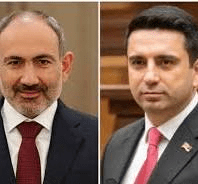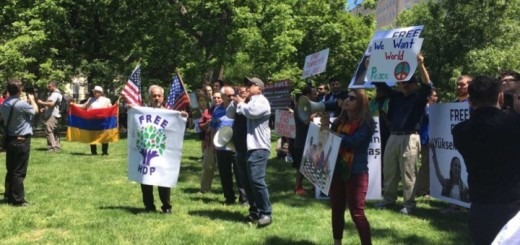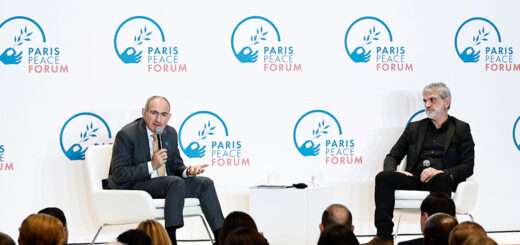Pashinyan’s Government: Dismantling Armenia from Within — By Harut Sassounian

Armenia’s crisis deepens. With each passing day, the country’s incompetent rulers strip away its sovereignty piece-by-piece, dismantling the nation they were elected to protect.
Armenia’s leaders now echo the talking points of its sworn enemies — the Presidents of Turkey and Azerbaijan — as though they occupy Prime Minister Nikol Pashinyan’s chair in Yerevan.
Armenia’s highest officials made several contradictory and anti-Armenian statements this past week:
In the run-up to next June’s parliamentary elections, Pashinyan has flooded the public with hollow promises of peace. Yet, even after he made series of humiliating concessions, Pres. Ilham Aliyev spurns the so-called treaty, despite the August 8 White House meeting, which was staged to sign it.
On rare occasions, Pashinyan and Foreign Minister Ararat Mirzoyan have admitted the truth. In 2024, Pashinyan flippantly told the inhabitants of the border town of Kirants: “You may live without danger for seven days, but the eighth day may not be safe. What do I know?” Mirzoyan made the same admission last week while addressing the National Assembly: “Peace will not be fully established even if the agreement is signed with Azerbaijan.” But they quickly revert to the fiction that “peace has been established between Armenia and Azerbaijan.”
Pres. Trump’s August 8 promise to Pashinyan at the White House that he would urge Aliyev to release the Armenian prisoners has yielded nothing beyond mere words. Worse, Pashinyan asked Trump not to mention the prisoners in the Memorandum of Understanding, fearing that his political rivals, when released, could challenge him in next year’s elections.
After complying with Aliyev’s demand to dissolve the Minsk Group, Pashinyan used the excuse that it was “useless,” even though it kept the war at bay for nearly three decades. He even declared that the Karabagh issue was “resolved long ago.” If that were true, why would Aliyev need to wage a bloody war in 2020 to seize it?
The truth is Pashinyan surrendered Artsakh by scrapping negotiations, ignoring Minsk Group proposals, and arrogantly declaring in 2019: “I started the negotiations not from [Pres.] Serzh Sargsyan’s point, but from my own point. This is an important nuance.” Aliyev threateningly responded: “Negotiations with Pashinyan are useless and senseless…. In the absence of success in negotiations, Azerbaijan has the right to solve the problem with war.” After losing Artsakh, Pashinyan absurdly claimed that Armenia is now “more independent than ever before!” How can losing territory and thousands of lives make a country more independent? Would Prime Minister Benjamin Netanyahu return the West Bank, recognize Palestine, and then claim that Israel has become “more independent?” Only a defeated leader would come up with such a nonsense excuse.
Pashinyan also denied agreeing at the White House to give a U.S. company a 99-year lease to manage the road linking mainland Azerbaijan to Nakhichevan, thus contradicting Pres. Trump’s public statement.
At a press conference on August 28, Pashinyan boasted: “I am the government. No one can have any position that contradicts my position.” This is the clearest proof of his dictatorial mindset, despite his constant claims of leading a democratic country. The next morning, he fired Liparit Drmeyan, head of the International Legal Affairs Office, for acknowledging Armenia’s obligation to comply with an international arbitration ruling against the government’s illegal seizure of Samvel Karapetyan’s electricity network company. Even though Armenia had lost the arbitration decision, Pashinyan falsely claimed: “We have won in arbitration court.”
Not to be outdone, Parliament Speaker Alen Simonyan on September 11 made statements which are contrary to Armenia’s interests, by expressing empathy with Azerbaijan.
Asked whether Baku should allow the same reciprocal procedures for Armenian cargo crossing Azerbaijan, Simonyan responded: “The wounds are fresh, both on our side and theirs. Didn’t we also kill people? Didn’t people also die on the Azerbaijani side? It’s about face-to-face contact [on the border]…. During this sensitive period of rebuilding relationships and trust, the goal is to minimize that contact. Azerbaijan also has very big wounds. Azerbaijan reckons that … Armenia kept 20% of their country under occupation for 30 years and goes as far as making statements about genocide. This is their way of thinking, and it is obvious that it is very important for Azerbaijan to prevent any possible future threat.” Simonyan seems to have forgotten he is the Speaker of Armenia’s Parliament, not Azerbaijan’s.
Simonyan also mocked the political opposition parties, claiming they “cannot gather more than seven people in the streets of Yerevan,” and boasting that “a lot more people will gather in the streets if I put my picture there.” An opposition leader retorted: “Yes, a lot more people will gather around Simonyan’s picture in the street, to spit on it.”
Finally, the latest example of Pashinyan government abandoning Armenia’s sacred symbols is its decision to remove, as of November 1, the image of Mt. Ararat from the seal that border agents stamp on passengers’ passports. Will the capitulating government next rename the country “Ermenistan”?
Since Armenia’s government is not defending the nation, then the citizens must defend it. Every concession, every erased symbol, every echo of the enemy’s narrative is another step toward national erasure. The Armenian people — at home and abroad — must finally wake up and bring to power new leaders who will serve Armenia’s interests, not its adversaries. History will not forgive complacency. The time to act is now — before there is no Armenia left to defend.





